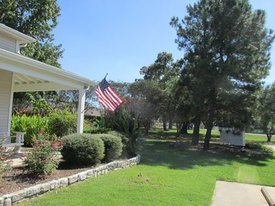Approximately 16% of Texas residents are enrolled in Medicaid, the federally mandated health plan for needy people that includes various benefits, such as hospital and primary physician services and long-term care in a nursing facility. Each state administers its own Medicaid program and may provide optional benefits through state-specific Medicaid waivers.
In Texas, most Medicaid programs and plans are delivered through managed care organizations, and MCOs vary between counties.
To qualify for long-term Medicaid services, including home and community-based waivers, seniors must meet the following criteria:
- Have a monthly income of $2,313 or less per applicant
- Own less than $2,000 in countable assets per individual or $3,000 per couple when both spouses are applying for coverage
- Be permanent residents of the state
- Be U.S. citizens or hold eligible immigration status
- Have a valid Social Security Number
- Need at least 30 continuous days of care at the level normally provided in a nursing facility and have this need verified by a licensed medical doctor
Some assets are exempt from Medicaid limits, including personal belongings, one vehicle, household goods and an owner-occupied home worth up to $585,000. Cash, investments and recreational and commercial real estate are all countable.
Community Spouse Income and Asset Exemptions When only one spouse in a married couple requires long-term Medicaid services, the non-applicant (community spouse) is not expected to finance that care and their income is disregarded on the Medicaid application.
If the community spouse depends on the applicant’s income for financial support, the applicant may be able to provide the community spouse with up to $3,160.50 per month as a minimum monthly needs allowance. This amount is deducted from the applicant’s declared income on their Medicaid application.
If only one spouse in a married couple needs long-term Medicaid coverage, special income and asset rules apply to the non-applicant (community spouse). The income of the community spouse isn’t factored when calculating Medicaid eligibility.
The applicant may be able to reduce their declared income by transferring up to $3,160.50 per month to the community spouse under the minimum monthly needs allowance rule. The community spouse may also keep up to $126,420 worth of the couple’s joint assets, in addition to the marital home and one vehicle under the community spouse resource allowance rule.
STAR+PLUS Home and Community-Based Medicaid Waiver Seniors who qualify for long-term Medicaid services may be eligible for enrollment in
STAR+PLUS, a Texas Medicaid managed care nursing-home diversion program.
STAR+PLUS lets seniors who meet the criteria for nursing home placement remain in a noninstitutional setting, such as assisted living, by funding supplemental services and community-based supports. Eligibility is determined by an assessment administered by the Texas Health and Human Services Commission to determine if the applicant can live safely outside a nursing facility with the assistance offered through the STAR+PLUS program.
Every STAR+PLUS medical plan includes all mandatory Medicaid services as well as primary home care, adult day health services, personal care and medical supplies. Participants may also be provided with nursing services, rehabilitation therapies, an emergency call system, home delivered meals and respite care. Seniors who are moving from a nursing home into an assisted living setting are also eligible for transitional services.
Applicants approved for STAR+PLUS services receive notification by mail along with an information package outlining the available plans. Participants have 15 days to choose a plan, otherwise, the HHSC assigns a plan and primary physician. Seniors can change their STAR+PLUS plan and/or their doctor as frequently as every 30 days.
Mount Pleasant is in the MRS Northeast Texas STAR+PLUS service area. Plan providers here are Cigna-HealthSpring and United Healthcare.
To learn more about Medicaid and the STAR+PLUS home and community-based waiver, contact the
Health and Human Services Commission office at (888) 337-6377.








